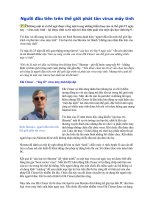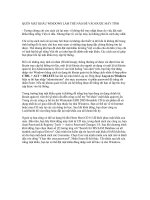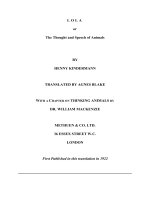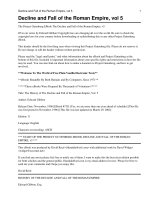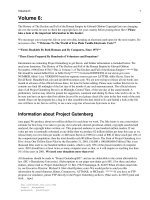Punch - Or, The London Charivari, Vol. 104by May 13, 1893 By Sir Francis Burnand potx
Bạn đang xem bản rút gọn của tài liệu. Xem và tải ngay bản đầy đủ của tài liệu tại đây (3.26 MB, 69 trang )
Punch; or, the London
Charivari, Vol. 104:
May 13, 1893
Edited by Sir Francis Burnand
Punch; or, the London Charivari, Vol. 104: May 13, 1893
1
MIXED NOTIONS.
No. X.—THE BEHRING-SEA ARBITRATION.
(Scene and Persons as usual. The Conversation has already begun.)
First Well-informed Man (concluding a tirade). —— so what I want to
know is this: are we or are we not to submit to the Yankees? It’s all
very well talking about Chicago Exhibitions and all that, but if
they’re going to capture our ships and prevent us killing seals, why,
the sooner we tell ‘em to go to blue blazes the better. And as for its
being a mare clausum——
Inquirer (interrupting). Who was she? What’s she got to do with it?
First W. I. M. (laughing vigorously). Ha! ha! that’s a good ‘un.
Inquirer (nettled). Oh, laugh away, laugh away. That’s you all over.
First W. I. M. My dear chap, I’m very sorry, but I really couldn’t help
it. There’s no woman in the business at all. Mare clausum merely
Punch; or, the London Charivari, Vol. 104: May 13, 1893
2
means the place where they catch the seals, you know; mare, Latin
for sea.
Inquirer. Oh! I should have known that directly, if you’d only
pronounced it properly. But what does clausum mean?
First W. I. M. Well, of course, that means—well, a clause, don’t you
know. It’s in the treaty.
Average Man (looking up from his paper). It used to be the Latin for
“closed,” but I suppose it’s altered now.
First W. I. M. (incredulously). It can’t mean that, anyhow. Who ever
heard of a closed sea, I should like to know?
Second W. I. M. (hazarding a suggestion). It might mean a harbour, you
know, or something of that sort.
Average Man. I daresay it might mean that, but it doesn’t happen to be
a harbour (relapses into paper).
Second W. I. M. Oh, well, I only made the suggestion.
[A pause.
Inquirer. But what are they arbitrating about in Paris? It says (reading
from newspaper) “When Mr. C
ARTER, the United States Counsel, had
concluded his speech, he was complimented by the President, the
Baron
DE COURCEL, who told him he had spoken on behalf of
humanity.” I thought old C
ARNOT was President of the French
Republic.
First W. I. M. So he is.
Inquirer. But this paper says Baron
DE COURCEL is President.
Second W. I. M. Oh, I suppose that’s one of C
ARNOT’s titles, All these
blessed foreigners are Barons, or something of that sort.
Punch; or, the London Charivari, Vol. 104: May 13, 1893
3
Inquirer. Ah, I suppose that must be it. But what have the French got
to do with the Behring Sea? I thought it was all between us and the
Yankees.
First W. I. M. So it is—but the French are arbitrating. That’s how they
come into the business. I can’t say, personally, I like these
arbitrations. We’re always arbitrating now, and giving everything
away. If we think we’re right, why can’t we say so, and stick to it,
and let the French, and the Yankees, and the Russians, and all the
rest of ‘em, take it from us, if they can?
Second W. I. M. Take what from us?
First W. I. M. Why, whatever it happens to be, the Behring Sea, or
anything else. We’re so deuced afraid of everybody now, we never
show fight; it’s perfectly sickening. But of course you can’t expect
anything else from old G
LADSTONE.
Second W. I. M. That’s right—shove it all on to old G
LADSTONE. But
you’re wrong this time. It was J
O CHAMBERLAIN, one of your own
blessed Unionists, that you’re so proud of, who arranged this
arbitration.
First W. I. M. I know that, my dear boy; but C
HAMBERLAIN was a
Radical then; so where are you now?
[A pause.
Inquirer (who has continued his reading, suddenly, with a puzzled air). I
say, you know, this is too much of a good thing, bringing the
Russians into the business. It says—(reads)—”documents were
submitted, on behalf of the United States, to prove that Russia had
never abandoned her sovereign rights in the manner suggested by
Great Britain.” How, on earth, does Russia manage to crop up
everywhere? And where is this confounded Behring Sea?
Second W. I. M. (vaguely). It’s somewhere in America, or
Newfoundland, or thereabouts.
Punch; or, the London Charivari, Vol. 104: May 13, 1893
4
Inquirer. But how about Russia?
Second W. I. M. Oh, Russia shoves her oar in whenever we get into a
difficulty of any kind anywhere.
Inquirer (persisting). Yes—but how can she have any “sovereign
rights” in America?
Second W. I. M. (haughtily, but evasively). My dear fellow, if you had
followed the thing properly, you wouldn’t ask the question. There’s
no time now to explain it all to you, as it’s very complicated, and
goes back a long way. But you may take it from me that Russia has
got certain rights, and that she means to make things as disagreeable
for us as she can.
[A pause.
Inquirer. It’s rather a rum start, isn’t it? sending out Sir C
HARLES
RUSSELL and Sir RICHARD WEBSTER. They’re on opposite sides of
politics.
First W. I. M. That’s just why they send ‘em. R
USSELL has got to put
the Liberal view, and W
EBSTER the Conservative.
Inquirer. Of course, of course; I never thought of that. By the way,
have you ever seen a seal?
First W. I. M. They’ve got one at the Zoo. Catches fish, and kisses the
keeper, and all that sort of game.
Inquirer. What, that big beast that looks as if it was made of india-
rubber, with long whiskers and a sort of fish-tail?
First W. I. M. That’s it.
Inquirer (with profound disgust). Well, I am blessed! Is that all they’re
jawing about?
[Terminus.
Punch; or, the London Charivari, Vol. 104: May 13, 1893
5
IN MEMORIAM—”THE DEVIL’S OWN.”
[“Notwithstanding the efforts made by the Inns of Court Rifles,
supported by the Authorities of the Inns, to increase the strength of
the corps, the additional enrolments lately made have been judged
by the War Office not sufficient to warrant the continued
maintenance of the corps as an independent battalion; and orders
have been given for its reduction from six to four companies, for the
withdrawal of the Adjutant, and for the attachment of the corps to
the 4th Middlesex Rifles.”—Daily Paper.]
Oh, how bright were the days when we all of us saw
In their martial equipment the limbs of the Law.
With their helmets and rifles, and pouches complete,
(May I quote from the ladies), they “really looked sweet.”
The Colonel, the Major, and all their attendants,
Appeared not as counsel, since all were defendants;
And no soldierly spirit could equal the Bar’s,
When Themis, its goddess, was mated with Mars.
No more shall they charm us; harsh Fate with her shears
Has severed the thread of the Law’s Volunteers.
And, whatever the cause was, ‘twas certainly true
That these fee-less defenders at last were too few.
So now they’re absorbed, and, no longer the same,
They lose by attachment their being and name.
And the old Devil’s Own, from their discipline loosed,
Have gone to their owner; i.e., they’re re-duced.
Punch; or, the London Charivari, Vol. 104: May 13, 1893
6
ENGLISH AS SHE IS SPOKE.
(In the House and out of it.)
The Parliamentary Committee appointed to consider the best mode
of reporting in the House, have decided that it will be advisable to
allow Members to have an opportunity of revising their speeches
after they have been “taken down” verbatim. The result of this
suggestion will probably be as follows:—
“Spoke? Rather!”
MR. SYMPLE-STUTTER’S SPEECH.
(Verbatim Report.)
Mr. S
PEAKER, Sir, What I mean to say, I venture to think is that the
British Empire—yes Sir—that is what I venture to think, and I am a
Punch; or, the London Charivari, Vol. 104: May 13, 1893
7
young Member. For I do not believe—no not now—or in fact, when
otherwise. For envy and malice are together. I venture to think that
sometimes the British Empire. Yes Sir, for the enemies are at our
gates with the past and the future. When the sun sinks—not that it
follows—at least so I venture to think. You may believe me, Sir, that
it is farthest from my thoughts when the British Empire and the
sinking sun which I venture to think is—in point of fact the setting
sun, and I venture to think the British Empire, and that is I venture
to think was my proposal in the past—which has the terrors of the
present from generation to generation.
(Revised Report.)
Mr. S
PEAKER, Sir, at a time like the present—when the enemies of the
Empire are clamouring at our gates, when envy walks hand-in-hand
with malice, and our fate is in our own hands—we should be bold
and resolute. It is not for a young Member like myself to point out
the course that we should pursue, but I venture to think that, by
ignoring the terrors of the past with the courage of the present, we
shall avert the dangers of the future. It has been said—and truly
said—that the sun never sets upon the British Empire. Let us believe
in that sun, and find in its rays an earnest of that glory which was the
birthright of our ancestors, and which, should be the birthright of
our descendants from generation to generation.
Punch; or, the London Charivari, Vol. 104: May 13, 1893
8
ANTONY AND CLEOPATRA.
Antony J
OHN BULL. Cleopatra EGYPT. Mecænas H. L-B-CH-
RE. Enobarbus GL-DST-NE.
Mecænas (aside to E
NOBARBUS). “NOW ANTONY MUST LEAVE HER
UTTERLY
.”
Enobarbus (aside to M
ECÆNAS). “NEVER; HE WILL NOT.” (Apart.)
“A
T LEAST, NOT YET.”
Ant. and Cleo., Act II. Scene 2, adapted.
Punch; or, the London Charivari, Vol. 104: May 13, 1893
9
MR. GLADSTONE’S CHANGE OF NAME.
He was “The People’s W
ILLIAM.” He will
Be known in future as “Our Home-Rule B
ILL.”
Punch; or, the London Charivari, Vol. 104: May 13, 1893
10
H
IGH NOTES FOR A VIOLIN.—Last week a Stradivarius (vide Daily
News), a real genuine “Strad,” sold at P
UTTICK AND SIMPSON’S for
£860.
Fiddle de L. S. Dee!
Punch; or, the London Charivari, Vol. 104: May 13, 1893
11
I
N THE TIME OF THE RESTAURATION.—They’re going it! Feeding,
feeding everywhere, and not a bit to eat—without paying for it
pretty heavily. We gather from a note in Sala’s Journal, that L
ONG’S
Hotel now possesses a “Restauration.” Of course, those who live in
“Short’s Gardens,” won’t be able to patronise “L
ONG’S.” The
management is announced as under the direction of a “M.
DIETTE,”
and, as he has obtained no inconsiderable renown (so we are
informed) at the Berkeley and Bristol, patrons of L
ONG’S may expect
something superior, by way of “D
IETTE-ary.”
Punch; or, the London Charivari, Vol. 104: May 13, 1893
12
MR. PUNCH TO THE BETROTHED PAIR.
(The Duke of York and the Princess May of Teck.)
M
AY 3, 1893.
‘Mid the bird-chorus of the May,
From glade and garden madly ringing,
There sounds one welcome note to-day,
Round the glad world its way ‘tis winging.
You hear—you hear the general cheer
That greets it! ‘Twill suffice to show you
That all who love you joy to hear.
And all who love are all who know you!
Soft music of the marriage-bell
Seems woven ‘midst the world’s Spring Voices.
In truth, there’s little need to tell
How in the prospect Punch rejoices.
His well-pleased eye has watched your way;
His loyal heart has shared your sadness;
Now on this bright Betrothal-Day
Your gladness he acclaims—with gladness!
Punch; or, the London Charivari, Vol. 104: May 13, 1893
13
How is Mr. F.
LUKE FILDES, R.A.?—In excellent health we sincerely
hope, but from seeing daily, in the front sheet of the Times, an
advertisement commencing “The Doctor after L
UKE FILDES, R.A.”
Many friends began to feel anxious. We are glad to be able to add,
that, in answer to the numerous inquiries made at 39, Old Bond
Street, a most satisfactory report has been obtained.
Punch; or, the London Charivari, Vol. 104: May 13, 1893
14
“HONOURS EASY.”
First Undergraduate. “I
SAY, OLD MAN, DID YOU WIN YOUR
MONEY?”
Second Un. “‘C
OURSE NOT; WON SOMEBODY ELSE’S. YOU LOST
YOUR
COIN, DIDN’T YOU?”
First Un. “M
Y COIN! WHAT ARE YOU TALKING ABOUT? I LOST THE
GUV’NOR’S!”
Punch; or, the London Charivari, Vol. 104: May 13, 1893
15
MUSE v. MECHANIC.
[“Mr. N
ORMAN GALE—the Muse of orchards and pretty girls with
polished knees; a charm often left unsung.”
—Mr. Andrew Lang on the Poems of “A Country Muse.”]
“A Country Muse” sings, if you please,
Of pretty girls “with polished knees”!
One would not quite demolish
The graphic rhymester’s stock-in-trade,
But if bare knees must be displayed,
He might forego the polish.
It smacks of fustian! Workmen’s “bags”
Are very “polished” where the “sags”
From salient joints protuberant,
Grow shiny with continual friction;
But “polished knees” in poet’s diction
Strike one as too exuberant.
Say varnished elbows, burnished knuckles,
And you’ll elicit scornful chuckles
From Muse and from Mechanic!
Selections from the terms of trade
Would put, I’m very much afraid,
Parnassus in a panic.
The bards are sometimes rather free
With feminine anatomy;
Their catalogues erotic
Of pretty girls’ peculiar “points,”
Their eyes and limbs, and curves and joints,
Are often idiotic.
But if we must be told, sometimes,
Ladies have limbs, then that your rhymes
Punch; or, the London Charivari, Vol. 104: May 13, 1893
16
May not offend or fog any,
Don’t mechanise a maiden’s charms;
Leave “polishing” to legs and arms
Of walnut or mahogany.
Punch; or, the London Charivari, Vol. 104: May 13, 1893
17
RHYMES ON THE DECAY OF ROMANCE.
(Suggested by Mr. Frederic Harrison’s recent Article in “The Forum.”)
Oh, list to Mr. H
ARRISON lamenting from The Forum,
Imagination done to death by latter-day decorum!
“Good boys and girls” we’ve all become, and modern men and
maidens see
The world with such prosaic eyes, Romance is in decadency!
We’re too absorbed in Politics, enamoured of Monotony,
To give an ear to Geniuses (supposing we had got any!)
But First-Class in our Fiction Mr. H
ARRISON abolishes,
Indeed most Authors travel Third, their talent so toll-lollish is.
It’s all the Fin-de-Siècle’s fault—and this, of course, a true bill is;
For Genius puts its shutters up when centuries pass their jubilees!
As Mr. H
ARRISON can prove by references historical,—
And any utterance of his is equal to an oracle.
We cannot stand a novel now, he says, if there’s a shock in it;
Prefer our heroine angular, her eye must have a cock in it,
Unless she’s dull and middle-aged, no sympathy have we with her,
Her sole excitement is to ask a plainer friend to tea with her!
He thinks, were Pickwick written now, we’d view it with a cooler eye,
And term the Trial Scene a piece of “riotous tomfoolery;”
While Jane Eyre’s thrilling narrative of Rochester’s sad revelries
Of “shilling shockers” scarcely would to-day above the level rise!
An age that’s given up its gas to read by Electricity
Would naturally be repelled by T
HACKERAY’S causticity,
And scorn the characters of S
COTT, because they had Glengarries on,
An inference which is obvious—to Mr. F
REDERIC HARRISON!
Punch; or, the London Charivari, Vol. 104: May 13, 1893
18
How scathingly does he denounce our Literature degenerate,
With not a real Romancer left—or only two at any rate!
By “desperate expedients,” each the old tradition carries on—
“But it’s no good”—as they’re informed by Mr. F
REDERIC HARRISON.
For Mr. S
TEVENSON can write no stories worth hurraying at,
While he upon Pacific Isle persists in Crusoe playing at!
And Mr. K
IPLING’s ceased to count—no heart in what he does is
there—
He longs for death in far Soudan, a-fighting Fuzzy-Wuzzies there!
So we’ve only Mr. M
EREDITH—(oh, what a sad disgrace it is!)
Though Mr. B
LACKMORE writes romance—how poor and
commonplace it is!
While Messrs. T
HOMAS HARDY, BLACK, and BESANT, it would
seem, are all
Unworthy serious notice, mere nonentities ephemeral!
Some people like Miss B
RADDON, Mrs. OLIPHANT, Miss
B
ROUGHTON, too.
They’re only lady-novelists—so serious readers oughtn’t to,
And those who’ve been convinced by his invidious comparisons,
In future will eschew romance—excepting Mr. H
ARRISON’S.
Punch; or, the London Charivari, Vol. 104: May 13, 1893
19
T
HE DARWINIAN THEORY EXEMPLIFIED.—At the Zoo is now being
exhibited “Three White-tailed Gnus,”—”The Latest Gnus.” with the
best possible intelligence,—”and a Black-capped Gibbon.” This last is
evidently a descendant of the great historian; though, if this
exemplifies “the survival of the fittest,” where are the others of the
race? Then “Black-capped” sounds ominous, as if this particular
Gibbon stood self-condemned, and was soon to disappear. Should
this be the case, the Zoo Authorities ought to advertise the fact, and
give visitors a chance before it is too late.
Punch; or, the London Charivari, Vol. 104: May 13, 1893
20
ESSENCE OF PARLIAMENT.
E
XTRACTED FROM THE DIARY OF TOBY, M.P.
House of Commons, Monday Night May 1.—Demonstrated in Debate
on Second Reading Home-Rule Bill that House may talk and talk
through twelve long nights, and not affect single vote—not even
S
AUNDERS’S. To-night shown how a single speech may cause to
collapse what was expected and intended to be big Debate. It was
Mr. G. performed the miracle. Looked in at House on his way from
Downing Street, where he had received deputation on Eight Hours
Question, and delivered important speech. That might have served
as day’s work for ordinary man, Mr. G., not to put too fine a point
upon it, is not ordinary man. Being here, sat listening to D
ILKE with
close attention. D
ILKE thinks time has come to evacuate Egypt. Stated
his case in luminous speech; sustained his reputation of knowing
more about Egyptian Question than most men except perhaps
T
OMMY BOWLES.
Mr. G. made no outward and visible sign of intention to follow; took
no notes, and sometimes, as he sat with drooping arms and closed
eyes, seemed to sleep. D
ILKE done and down, he sat bolt upright,
looked round with almost startled air, “Well, really,” he seemed to
be saying to himself, “since I am here, and no one else is disposed to
follow, I might as well say a few words.”
Spoke for half an hour, without reference to a note, and without
faltering for a word. Preserved throughout that studious assumption
of having accidentally looked in which marked his appearance at
table. Evidently desired to minimise as much as possible importance
of occasion. Subject broached, he was, possibly, expected to say
something; certainly not going to make a speech, much less deliver
oration. Carried out this subtle fancy to such extent that, pitching
voice on low conversational tone, sometimes difficult to catch full
length of sentences. This added to impressiveness of scene. Crowded
House sitting breathless; Members opposite leaning forward lest
Punch; or, the London Charivari, Vol. 104: May 13, 1893
21
they might miss a phrase. Everyone conscious that at the door also
listening were jealous France, the wily Turk, the interested Egyptian,
the not entirely disinterested C
ZAR, and the other Great Powers
concerned for peace of Europe.
Mr. G., for all his affectation of unpremeditation, evidently had in
mind these listeners at the door. To their shadowy presence was, for
him, added consciousness of keen eyes watching him from all
quarters of the House; some of his friends waiting for sign of
readiness to quit Egypt; the Opposition ready to catch at any token
of tendency to scuttle. Occasional passages he delivered at rapid rate;
but you could see him weighing every word with due consideration
of these manifold and conflicting interests and influences.
When he sat down, there was consciousness that the massive figure
of important Debate that had loomed over House whilst D
ILKE was
speaking had melted away. J
OKIM and GORST had intended to speak
from Front Bench; great authorities on Foreign Policy in other parts
of House had proposed to say something, more or less soothing. Mr.
G. had left nothing for anyone to say, unless it were A
LPHEUS
CLEOPHAS, and the TALENTED TOMMY, who, sitting immediately
opposite the P
REMIER, had, whilst he spoke, taken voluminous notes,
only occasionally withdrawing eyes from manuscript to fix them
with look of calm distrust upon the aged and unconscious statesman.
“I always like, when I look in,” said M
ARJORIBANKS, smiling
beneficently from the Bar, “to find T
OMMY in his place, taking notes.
Gives one a sense of security. I feel, when I’m in the Lobby, looking
after things, it’s all right in the House. B
ROWNING said something of
that sort. Don’t remember exactly how it ran; something in this way:
T
OMMY BOWLES is in his place;
It’s all right with the Empire.”
Business done.—Mr. G. excelled himself.
Tuesday.—Seven-leagued Boots not needed by T
ALENTED TOMMY. He
moves about universe with ease and grace, unmindful of mountains,
Punch; or, the London Charivari, Vol. 104: May 13, 1893
22
regardless of ravines, reckless of rivers, oblivious of oceans. Last
night, Forty Centuries looked down upon him whilst he showed
how, in Egypt, Mr. G. is wrong, and D
ILKE, who criticised Ministerial
policy, is not right. To-night he stands on the Roof of the World, a
solitary, colossal figure upright on the lone Pamirs. His attitude is of
manifold mien. Defiant of Russia, suspicious of R
OSEBERY,
patronising towards Afghanistan, he takes young China familiarly
by the elbow, and bids it be of good cheer, for T
OMMY BOWLES is its
friend. Since N
APOLEON crossed the Alps, and was caught in the act
by the brush of the painter, the world has not seen so moving a
picture as T
OMMY throned on the grandly desolate Pamirs.
A PATRON OF OLD CHINA.
(Vide “China Bowles Collection.”)
House almost empty whilst the Talented One discoursed on the
subject. Mr. G., who misses nothing, happily in his place, listening
with eager hand at ear whilst T
OMMY spoke familiarly of Asiatic
rivers and mountains, not one with name of less than five syllables.
D
ICKY TEMPLE, who really knows something about this mysterious
Punch; or, the London Charivari, Vol. 104: May 13, 1893
23
region, looked on in blank amazement at TOMMY’S erudition.
E
DWARD GREY, who would presently have to answer this damaging
attack, tried to seem indifferent. But his young cheek paled when
T
OMMY put his ruthless finger on that Foreign Office dispatch, out of
which a line of print had been dropped. This a Machiavellian device
that had hitherto escaped detection. T
OMMY’S falcon eye had noted
it, his relentless foot had followed up the tracks, and he had
discovered, on reference to the original, that the criminally-deleted
line of print embodied a reference to the Oxus. That was all. “Only
the Oxus!” he said, with withering sarcasm. Then changing his tone
and manner, he shook a minatory forefinger at the shrinking form of
the P
REMIER, and cried aloud, in voice strengthened with long
warring with the winds on the Pamirs: “Sir, the stream of the Oxus
has been entirely omitted from this paragraph.”
“Poor Mr. G.!” said W.
J. LOWTHER, present in his capacity as Ex-
Under-Secretary for Foreign Affairs. “What with L
ABBY one night
and T
OMMY BOWLES the next, he has a sad time of it.”
“Yes,” said P
LUNKET, sole companion on the Front Bench. “It’s a
hard fate for a Prime Minister to stand between L. and T
OMMY.”
Business done.—Miscellaneous talk on going into Committee of
Supply.
Thursday.—Little difficulty arisen in connection with Budget. S
QUIRE
faced by deficit of million and half. This he met by expedient that
will be historical, as affording J
OKIM opportunity for a popular jape.
The S
QUIRE has dropped his penny in the slot, in accordance with
directions, pulls out the drawer, and finds there is something more
than the sum necessary to balance the year’s account. That is all very
well; but there are some amateur C
HANCELLORS of the EXCHEQUER
who would do great things with the odd £20,000 or £30,000 which
remains as surplus. C
LARK wants Graduated Income-tax; BARTLEY
proposes Abatement on Incomes below £200; whilst G
RANT LAWSON
would let farmers off with half the proposed increase. Best of all is,
A
LPHEUS CLEOPHAS, who would straightway abolish the tax on tea.
